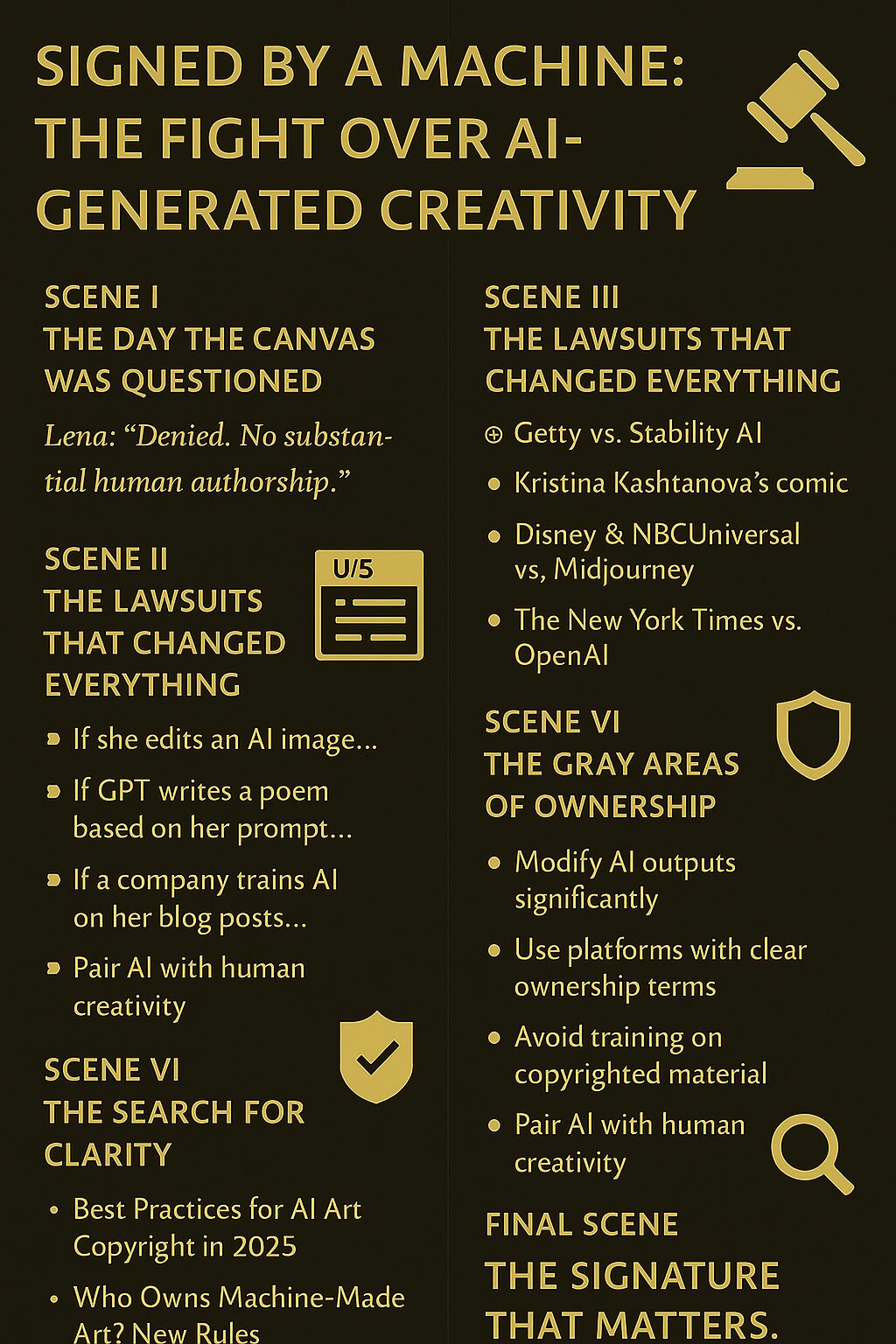Introduction
As generative AI tools like GPT-5, Midjourney, and DALL·E become mainstream in creative industries, a pressing legal question has emerged: Who owns AI-generated content? In 2025, this issue has sparked a wave of copyright lawsuits, forcing courts, creators, and tech companies to confront the boundaries of authorship, ownership, and fair use.
This article breaks down the current legal landscape, landmark cases, and what businesses and creators need to know to stay compliant in the age of machine-made creativity.
⚖️ The Legal Status of AI-Generated Content
🧠 U.S. Copyright Office Position
- AI-generated works cannot be copyrighted unless there is substantial human authorship
- Merely prompting an AI tool is not enough for copyright protection
- Applicants must disclose AI involvement when registering creative works
🌍 Global Perspectives
| Jurisdiction | AI Copyright Status |
|---|---|
| United States | No copyright without human authorship |
| European Union | Human authors only; TDM exceptions for training |
| United Kingdom | Copyright granted to person arranging creation |
| China | Copyright allowed with substantial human input |
| Japan | Requires human emotion and thought involvement |
🔍 Key Lawsuits Shaping the Debate
📸 Getty Images vs. Stability AI
Getty alleges Stability AI used millions of copyrighted images to train its model without permission
🎨 Kristina Kashtanova Case
The U.S. Copyright Office denied protection for AI-generated comic book illustrations, citing lack of human authorship
🎬 Disney & NBCUniversal vs. Midjourney
Studios claim Midjourney enabled unauthorized generation of iconic IP (e.g., Darth Vader, Elsa), pushing for stricter safeguards
📰 The New York Times vs. OpenAI & Microsoft
NYT alleges its articles were used without consent to train GPT models, raising questions about fair use and licensing
🧩 Core Legal Questions
- Can AI-generated content be copyrighted? Only if a human provides meaningful creative input
- Is training AI on copyrighted material legal? Courts are divided; fair use vs. infringement is still being tested
- Who owns the output—AI developer or user? Most platforms (e.g., OpenAI) assign ownership to the user via terms of service
💼 Implications for Creators & Businesses
✅ Best Practices for Copyright Compliance
- Document your creative process and human contributions
- Modify AI outputs significantly before claiming authorship
- Disclose AI involvement in copyright applications
- Use licensed or public domain training data
- Review platform terms of service for ownership rights
⚠️ Risks to Watch
- Unauthorized use of copyrighted training data
- Infringement claims from original creators
- Lack of clear ownership for purely AI-generated works
📈 SEO Tips for AI Content Creators
✅ Search-Friendly Titles
- “Who Owns AI-Generated Content? Copyright Lawsuits Explained (2025)”
- “AI Copyright Law: What Creators Must Know in 2025”
✅ High-Impact Keywords
- “AI copyright lawsuits 2025”
- “GPT-5 content ownership rules”
- “AI-generated art copyright protection”
✅ Metadata Optimization
- Alt Text: “Infographic showing legal ownership of AI-generated content across jurisdictions”
- Tags: #AICopyright2025 #WhoOwnsAIContent #GPT5Legal #AIContentLaw #FairUseVsInfringement
Final Thoughts
The copyright debate over AI-generated content is far from settled. As lawsuits unfold and legislation evolves, creators and companies must stay informed and proactive. The future of AI creativity depends on finding a balance between innovation and intellectual property rights.

